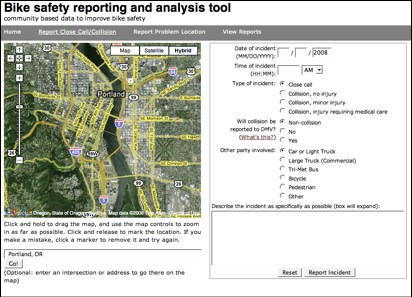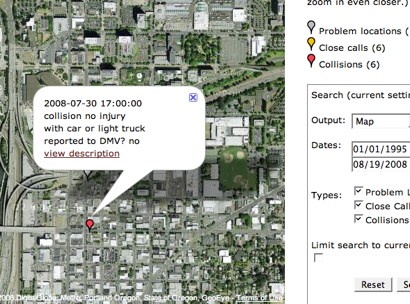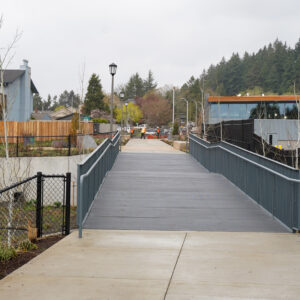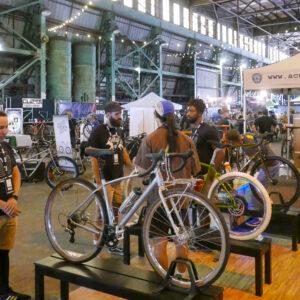
(Click to enlarge)
A graduate student at Portland State University’s Center for Urban Studies has made exciting progress on a tool that will allow the community to report close calls, collisions and problem locations.
The last time I mentioned a close calls map was in January of 2006. Several months after that story I received an email from Joe Broach, a Southeast Portland resident (from Missoula Montana) who’s working on his PhD in transportation at PSU. He wanted to know if anything had come of that project. When I said no, he decided to take on the task himself.

(Photo © J. Maus)
The idea was to build an online tool to capture information about collisions and near misses involving bicycles that are never reported (or are reported from a car-centric point of view).
Joe said he was first inspired to do this in the wake of the two bicycle fatalities in Portland last October. Traffic safety was front page news after those incidents and Joe said he knew the stats and graphics about crashes in the media were incomplete.
“It was frustrating, because I knew the data was limited. Cyclists know so much, they’re like pedaling databases, but that information wasn’t being captured.”
The new tool — tentatively named the Bike Safety Reporting and Analysis Tool — is integrated with Google Maps and can feasibly be used for any city or location. Users must register with a valid email address and once logged in, can fill out a simple form to record the specific details of their incident (date, time, type vehicle involved, etc…) and share a description of what happened. Users can also report “problem locations” by locating the area on the map and describing their concerns.
In addition to logging incidents and concerns, users of the tool can view existing reports (screenshot below). The incidents are color coded by type (near miss, problem location, or collision) and users can filter their view by geographic area, date incident occured, and type of incident. There is also an option to output the data via the standard Google Map view, by a text-only view, or via a comma separated value (CSV) file.

The potential of this tool is staggering. The data can be used any number of ways and it has been developed with standardized coding languages so it can be shared across many platforms.
Another exciting component is that, upon registration, users can opt-in to an email list giving permission to be contacted about safety research or analysis in and around locations they’ve reported on.
For example, let’s say PDOT wants to get feedback on a certain neighborhood traffic safety issue in a specific location. They could query the database and send an email to everyone who has reported a bicycle crash or near miss in that area and invite them to the meeting.
The tool is going through some final testing and will be hosted on BikePortland.org once it’s ready for prime time (it will take the place of the Close Calls reports which has over 600 comments posted in the last three years).
What do you think about this? I realize we’re not letting you really kick the tires yet, but if you have feedback or questions, Joe and I would love to hear them.
Stay tuned…






Thanks for reading.
BikePortland has served this community with independent community journalism since 2005. We rely on subscriptions from readers like you to survive. Your financial support is vital in keeping this valuable resource alive and well.
Please subscribe today to strengthen and expand our work.
This IS good information but makes me think we do focus on the bad…what about tracking the good things too. I have extra-polite interactions from motorists on almost a weekly basis. Anyone intersted in those stories?
Nice work, Joe. I think this has the potential to be quite a valuable tool.
Would anyone be interested in a feature or a separate service that would allow you to get the motorist\’s address from their license plate number and write them a letter to explain your take on the collision/close call and possibly file a citizen-initiated citation when there is a violation of the traffic code by the motorist that lead to the incident?
I heartily welcome this tool. It will be a great benefit to our community. Joe & Jonathan, if there\’s anything I can do to help (test, donate code-monkey skills, etc), please let me know.
@bArbaroo
A tool like this would not be about \”focusing on the bad.\” It\’s about collecting data to identify problem points in the city. If there is a dense cluster of problems at one spot, that\’s data that can be used to get the city to do something about re-engineering the problem spot.
I\’d say that\’s focusing on the good.
City Departments of Transportation need these kinds of metrics. Otherwise, they just go off the police accident statistics and traffic theory. If we can get large enough samples and present that data in meetings, we can put together major infrastructure changes.
Any chance this could be extended to Seattle?
Can motorists use this to report cyclists who nearly cause accidents with cars and pedestrians, blow stop signs, fail to yield right of way, etc.?
just wonderin\’…
bArbaroo –
While tracking the good interactions would be an interesting study, the purpose of this tool is to identify areas where there may be necessary structural/design changes. Tracking the good interactions would most likely provide data that shows areas where people are more bike tolerant rather than revealing anything about design.
\”Can motorists use this to report cyclists…\”
Joe and I discussed that at length. At first I thought it would be OK, but upon further review we decided that the data would be much more pure if it all came from the bicycle-riding perspective.
Our last thought on this was to create a separate tool and brand specifically for people operating motor vehicles… and then you could do another tool for walking, etc…
\”Any chance this could be extended to Seattle?\”
The tool uses Google Maps and it\’s not limited in any way to just Portland. It should work just find for any city on the map.
It says it \”can feasibly be used for any city or location,\” but does that mean it\’s only Portland at the moment? Would it still be able to take in incidents from say, Vancouver or Beaverton?
@ bahueh
I would only hope so! Its just too bad there isn\’t a way to identify said person on bicycle like there is with license plates for cars…
Speaking of the soon-to-be old Close Call reports, does the city use them? Any need or plans to move that data into the new system?
\”Speaking of the soon-to-be old Close Call reports, does the city use them? Any need or plans to move that data into the new system?\”
brettoo,
At one point, the City said they\’d use the Close Calls to develop a map… but as I wrote above, that project hasn\’t progressed.
and yes, Joe has already populated the database with some of the Close Calls and we\’ll input more of them before the official launch.
What an excellent project!
My 2¢, it might be helpful to have an opinion about the source of the incident. As I reel through my personal close calls over the past 25 years I can divide them into three categories: I f&%@#-up. Someone else f&%@#-up. The problem was systemic, blind intersections, excessive speed limits, bad maintenence, etc..
As I honestly evaluate my close calls, the 1st category is the largest for me. However,there are bad intersections or roads that have caused close calls. It seems like PDOT would be most interested in systemic or infrastructure related incidents since they would yield to engineering solutions.
Thankfully for me, age, experience, and less beer has resolved most of my 1st category events. Hopefully Joe can easily adapt this to other cities?
Very exciting to see this type of data being collected on an ongoing basis and shared with the community in an open fashion. If it\’s as user-friendly as it sounds and cyclists start using it religiously to log incidents and close calls, this tool could be a very powerful tool to help prioritize known problem spots.
By the way: this looks very similar to the incident mapping that the BTA has been doing with the data that came out of their bike/bus and bike/rail incident survey earlier this year. Lots of incidents for just those two categories alone… which brings up the question: will this new tool allow cyclists to report on bike crashes due to tracks or other road hazards?
Following up on bArbaroo\’s suggestion:
What if in addition to reporting \”Problem locations\” you could report \”Well-designed locations\” or \”irresistible infrastructure\”?
While politically I endorse that all routes should be safe for all modes of vehicles, in practice I am willing to make modest adjustments to my route to incorporate good, safe bike infrastructure.
Often I find good infrastructure by using the excellent regional bike maps, but augmenting the static maps with a live geographic database sounds like a useful way to build community.
Jonathan,
How would I get in touch with Joe Broach? This is an idea that has been floating in my head for some time, so I am delighted that someone has undertaken it.
I would be most interested in using it here in New Brunswick and would like to talk to Joe to see if his interface is ready to support multiple locales [things like ISO dates, metric, message catalogues for other languages, etc].
are there any safeguards against data tampering or is this all up to the honor system?
No reason why it couldn\’t be used to highlight the positives as well?
Green dots vs red dots?
As with any self-reported sample set, I would expect the database to be subject to the biases of its audience.
The open nature of the system, while a desirable collection method, would leave it vulnerable to manipulation {not quite as overt as ballet box stuffing, but individuals with an agenda could skew the representation of specific event types within the database.
So, like most thinks in society, it will work better with a little honour and respect.
It would be helpful if people were asked to record all the details of the incident that insurance companies use to determine fault, too. Time of day (light or dark), traffic level, if the area is lit, if they were wearing reflective gear, if they had lights, those types of things. Knowing there are a collisions in a neighborhood is one thing, knowing there are a lot of collisions at night on a certain corner could help identify problems with visibility and I bet patterns would emerge.
It would also be very helpful to have a way to record common driver behavior in a location, such as people edging out to see around parked cars, or frequently darting out to beat traffic. I\’ve learned to anticipate how drivers will act on the roads I am familiar with, but that kind of knowledge would be invaluable to glean from other \”pedaling databases\” for neighborhoods where I don\’t know how drivers act.
Russell #7,
interesting point – but how would we know without tracking data? Are you assuming measuring good experiences wouldn\’t improve design; I think it might. I believe that there may be design features that influence courteous behavir – speed limits, street width, placement of traffic control devices to name a few. It is my experience is that motorosits are more courtesous on quiet neithborhood streets, but that\’s just anecdotal. It to me feels beyond \”interesting\” to look at that side of the equation. Knowing what design elements influence safe/courteous behaviour might add a valuable dimension to the study.
Great idea. I think there should be a box or two for whether the police were called, responded, cited anyone, etc.
As for close calls, this shouldn\’t be used for every time someone in a car told you to get off the road #$%&ing biker, it should be for when there was clear risk of a collision. I\’d like to see some mechanism for adding additional comments from other registered users to existing incidents. If I witness one of the reported cases, I might be able to add extra details about that case.
That, and a little GUI cleanup – the first part of \”will collision be reported to DMV?\” is next to the box labelled \”No collision\”, which is a little confusing, to say the least.
Report via SMS/text message!
You can report on life-threatening experience as you wait for the cops to show up (which they wont) and let your heart rate slow down. Or just keep riding and cause more near-crashes while you type into your phone 😉
Any thought of integrating bike theft reporting with this interface (or as you state above, a similar but separate method)?
Is there a database field for license plates? See if there\’s some repeat offenders running around? It\’d be interesting to add a choice for harassment too.
Bravo! I can\’t wait till I have a close call so I can stick a pin on the map!
What generally constitutes a close call?
How exactly will this be a \”bicyclist-only\” reporting system when, according to PDOT, 90% of Portland cyclists have driver\’s licenses? [Re: peejay] Also, will there be multiple comment fields for individual incidents? I can already see this turning into a google maps version of platewire.com…
Adding to the SMS/Text reporting, which is a great idea, there should be the ability to log license plate numbers and/or photos. I\’m sure there are great reasons to not share this with the public, but if cyclists could load this information it would be there if the police ever needed to get involved.
\”Joe and I discussed that at length. At first I thought it would be OK, but upon further review we decided that the data would be much more pure if it all came from the bicycle-riding perspective.\”
o.k. but what about when I, as a cyclist, have a near collision with another cyclist who blows a stop sign, or is riding on the wrong side of the road?
As for looking up license plate numbers and sending letters to people- file a police report and encourage them, strongly, to follow through with a warning letter. I used to work at an insurance agency, and looking up license plate data is privilaged information, as it should be. I\’d hate to have some crazy coming to my door just because they think I did something wrong in my car or on my bike. Let them take it to the cops and let the cops decide.
Will it cross reference license plates, so that 2 or more close calls throws up a flag?
Wow, what a coincidence. It sort of bothered me that something like this didn\’t exist, so I put up a similar type of tool (see http://www.flatreport.com/) a couple of weeks ago.
Mybikelane.com (http://nyc.mybikelane.com/) is another interesting site that combines Google Maps and bike advocacy.
Thanks for all of the comments.
Regarding abuse of the database/data tampering (#17,#19): there is some protection in that each report is linked to a specific email address. Anyone trying to \”stuff the box\” would be pretty obvious and could be filtered by anyone analyzing the data. Like Natty mentioned, if most users respect the system, it should be fine.
Regarding license plate tagging. The concept of the database was more to identify dangerous locations, not individuals. That said, the data will be open to everyone, so there\’s no limit on analysis. If someone wants to search descriptions for multiple plate matches, go for it!
(#26) wrote: \”o.k. but what about when I, as a cyclist, have a near collision with another cyclist\”
Close calls/collisions with other cyclists/peds are reportable in the current version.
(#25) From reading the current close calls thread, it seems like there\’s a pretty consistent definition being applied by cyclists independently. I think of it as an event when the chance of a collision was pretty high. For me, it\’s a couple or a few a year kind of thing. Clearly people have different thresholds for risk, and that would be something to keep in mind using the data.
Regarding why not track good interactions? Wow, I really hadn\’t thought of that. That\’s why community based research is so neat. Offhand, I\’m not quite sure what I\’d do with piles of happy encounters. Maybe that bike realtor could use them! If someone runs with this, it would be fun to see the results.
I\’m out of town for a week but will try to respond to more comments when I\’m back. Once this thing is ready for public testing, there will be plenty of opportunity for input.
best,
joe broach
I would love to see it have a way of reporting problem storm drains, then as they are replaced/fixed they get removed from the database until someone reports another problem with it (missing straps/broken/stollen)…
Wooo! This is fantastic! I love how the alt-transit and non-motorized transportation crowds benefit from PSU\’s urban studies/planning/transportation departments.
Collecting license information and assuming that all close calls are caused by the driver smacks of arrogance.
There are two people involved in these incidents and both sides should be heard.
Collect all the data you want on close calls but please refrain from being judge and jury and pointing the finger of blame, since there is more than enough to go around.
This can be a great tool to determine areas of bad traffic engineering, it should not become a tool to beat up on drivers without a fair and equitable view.
Ralphie (#32), I think you read that into the comments. Nowhere is it said or implied that this will be \”assuming that all close calls are caused by the driver\”
The thrust of this seems to be to highlight infrastructure issues, which is really fantastic. This will shed light where it has previously been anecdotal or assumed. While an engineer (or intelligent layman) can analyze an intersection and point out potential problems, this tool will show us what intersections (or other elements) are actually introducing risk for cyclists.
While I\’m not the spokesperson, my guess is that this tool is being created with the simple intent to improve cycling safety in PDX. Sounds good to me.
Focusing on the bad is the only way we can better involve law enforcement when cars and bikes mix poorly. The more Portland grows, the more of these sorts of interactions we\’re bound to have. Bravo to Joe for putting something like this together.
To focus on the good, perhaps every bike rider ought to carry a stack of brief homemade notes that say something like \”thanks for sharing the road!\” — and where/when appropriate, take the extra minute or two to hand them out when something goes right.
Joe, you do us proud (those of us who teach at PSU and who commute by bike). What great initiative. I hope you get all the funding and cooperation you need. As someone who has been in tight spots, one collision, one insane incident with a rammy motorist, and who has complained formally about one bus almost creaming me well inside the bike lane, I really like the notion of a way to collect usable data, and you are doing it. Remarkable. Last week I watched in horror as a semi-truck nearly crushed a cyclist on my commute along Interstate from NoPo, something I wish I could have reported even though there was no actual accident–we NEED what you are doing and many thanks.
K\’Tesh, I think that storm drains come under the infrastructure heading, in that they are part of the design of a street or intersection.
This is an interesting idea!
This is a great tool. I\’ve been participating in a OHSU survey the past several months on bike commuting and have logged several close calls in the monthly surveys. Hopefully the OHSU researchers would be willing to share their data once the study is done. It would be a great way to populate this tool right off the bat.
I agree with Ryan #28 in regard to logging license plate numbers.
But why not show it to the public?
Then we could identify habitual offenders. Having the ability to search for a particular license number would be nice too. Or, maybe just identifying license numbers that have multiple complaints.
Zaphod #36,
Yes I based the comment on the comments posted.
Look at comment 41. All about humiliating someone in a car who doesn\’t have the ability to defend themselves against accusations.
Coyote in post 13 made an interesting observation in that as a rider many of the close calls were his own fault.
Any tool can be abused and here we already have people making this a tool of retribution rather than education.
My brother who is visiting up in Redmond, WA…which calls itself \”Bike capital of the NW\” What?!…reports being honked/yelled at twice in one day.
We do need a database for license plates of motor vehicles whose operators have harassed bicyclists by honking, coming too close on purpose, etc. Maybe not a big issue in close-in Portland, but its out there. Someone, the BTA?, should be tracking those yahoos and reporting data to the authorities.
\”collecting license information and assuming that all close calls are caused by the driver smacks of arrogance.\”
Incorrect. Single data points aren\’t going to throw up red flags. Multiple incidents can show a pattern of behavior. You get four or five from different sources over a long time period of time, that is indicative of poor behavior.
PS. Drivers already have this tool.
http://www.platewire.com/
Doesn\’t the posting of personal information, especially with regards to the commission of a crime (which is what I belive we are talking about), without fair representation, open the door to slander?
I see potential issues with precicely the type of fringe contingent that have flooded these boards with misinformation to further their agenda (anyone remember the posts on Latasha Williams or Karl Hugo?).
Jonathan, I believe this type of one-sided accounting does little to forward your refrain of harmony and could amount to facilitating both personal attacks and vigilanteism.
And though I am no lawyer, I would consider you an accomplice should a \’retributive\’ attack occur.
It took major legaslative action to occur for Megan\’s Law, and those are convicted scum.
Would like to hear how the true law enforcement contingent feel about this. I generally consider myself a libertarian, and believe there are enough laws on the books regarding conduct in general, that we fund the administration of those laws by way of taxation in the form of law enforcement, and see a distinction between calling out dangerous paths, etc. and passing judgement without due process.
There are nuts out there who will twist and use any info provided to further their agenda (probably even this post :).
Just askin\’
Peace
Re: postmoves 46
Some of these issues have been discussed in this article:
http://tinyurl.com/5wq5g2
Post moves #46
Don\’t we have the right to assemble and discuss things with other individuals and to collectively express, promote, pursue and defend our common interests?
light that puppy up. great idea. i was going to open up a twitter feed where you could text in license no\’s or other info for close calls. this idea\’s much more robust, more useful.
this looks great! — though I\’d encourage keeping the actual crash reporting well-separated from the far more subjective \”close calls\”, which is very much in the eye & mind of the beholder. Crashes leave physical evidence, however slight or major, while the \”close call\” category is entirely interpretive.
Not that close calls don\’t happen…or that a venue for reporting them isn\’t useful.